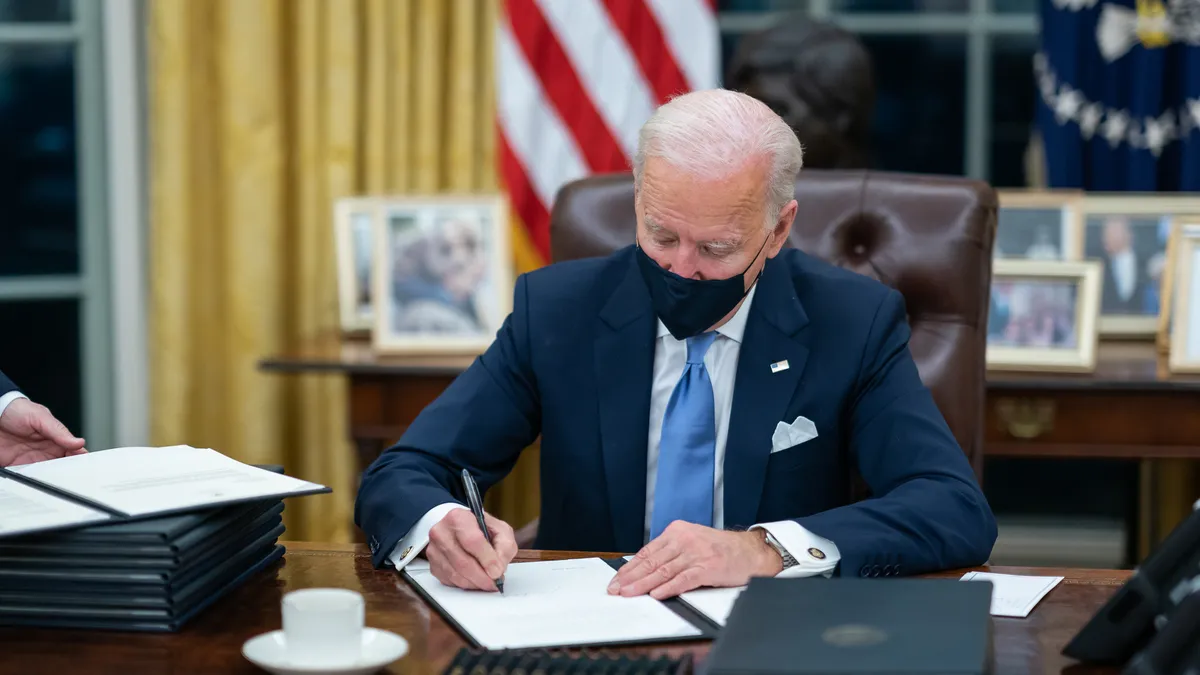Dive Brief:
-
The Biden administration plans to invest $12 billion to expand COVID-19 testing, with most of the money going to school screening programs.
-
By providing states with $10 billion for screening and other testing, the administration aims to enable schools to safely reopen in the remaining months of the academic year. CDC and other public health bodies will provide technical support.
- The statement lacks details of which companies will receive orders for tests. However, the administration quoted a CDC document that states both PCR tests that deliver results within 24 hours and point-of-care antigen kits are suitable for school screening programs.
Dive Insight:
The case for stepping up screening to support the reopening of schools, as is already happening in countries such as the U.K., has grown in recent months. Last month, a study commissioned by The Rockefeller Foundation found weekly testing with Abbott's BinaxNOW rapid antigen test reduced in-school COVID-19 infections by up to 50%. President Joe Biden outlined plans to reopen schools within 100 days upon taking office in January.
Now, Biden has provided further details about how his administration will help get schools open. The $10 billion will be split between U.S. states and commonwealths. Some big metropolitan areas, such as New York City and Los Angeles County, have funding that is ring fenced from the wider state. The amount of funding correlates to the size of the jurisdiction.
The Biden administration said use of “existing funding mechanisms” will ensure the money gets to schools quickly. Schools will be able to use the money to support testing of people suspected to have COVID-19 and to screen asymptomatic individuals. The Biden statement lacks details of how the testing will work in practice but a CDC publication from February that advises schools to “select tests that can be reliably supplied and that provide results within 24 hours” is likely to give the framework.
In the document, CDC says the time taken to get results from lab-based nucleic acid amplification tests such as PCR varies, meaning they may miss the 24-hour turnaround criteria, but point-of-care equivalents are available. Abbott’s ID NOW is such a fast-turnaround molecular test.
The CDC guidance notes antigen tests are less sensitive but are “a reasonable option for school-based screening testing” given their low cost, fast results and ease of implementation. Companies such as Abbott, BD and Quidel compete for the point-of-care antigen testing market. BD, which makes both types of test, talked up the value of antigen kits in the context of school screening programs.
“Antigen tests are ideal because they are easy to use, low cost, don’t require sophisticated lab equipment or personnel, can be performed in a CLIA Waiver point-of-care setting and most importantly, can provide a test result in 15 minutes when students are suspected of COVID-19, which allows for immediate isolation and other protective measures to minimize the spread of COVID-19,” Dave Hickey, BD's president of life sciences, said in an emailed statement.
Hickey and the wider diagnostic industry welcomed the funding. AdvaMed CEO Scott Whitaker called the funding “a big step forward for our country,” adding that diagnostic companies “are working 24/7 to manufacture the tests.”
Raj Shah, president of The Rockefeller Foundation, praised Biden’s commitment to building on early progress in reopening schools and “making it sustainable.” American Federation of Teachers president Randi Weingarten said the funding shows “help truly is on the way to aid school systems in implementing a testing system that will help keep students, educators and staff safe inside school buildings.”
Biden disclosed the school funding alongside details of a further $2.25 billion to “address disparities and promote equity in COVID-19 testing and mitigation.” The funding is intended to benefit high-risk and underserved populations, such as racial and ethnic minorities and rural communities.










